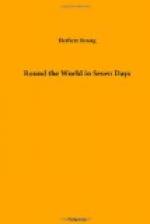“I do indeed. The loss of an hour may ruin everything. My plan was to leave here at 10.30.”
“But, my dear fellow, it’s that now, and past.”
Smith drew out his watch: it indicated 8.50. “London time,” he said. “You’re two hours in advance of it, aren’t you?”
Johnson laughed.
“Of course, we get used to our own time, here. But I was saying, if you must go, this is what I suggest. You can’t appear, and it’s as well, for you would certainly be delayed. I will go off to the Embassy and hustle a bit. If the wheels can be hurried, they shall be, I assure you. Then I’ll go on to Benzonana, get your petrol, and come straight back. Meanwhile take my advice and have a sleep, like your man there. You look dead beat, and no wonder. Why, I suppose you’ve had no breakfast?”
“I’ve had something, but not bacon and eggs, certainly. I shall do very well. I will take your advice; sleep is better than food just now. When you see Benzonana, ask if he has any addresses for me: Barracombe was going to wire some from London. Many thanks, old man.”
Johnson said a word or two to the captain, who nodded gravely as Smith flung himself down beside the aeroplane, and, resting his head on his arms, prepared to go to sleep.
The golfer knew the short cuts from the Ok Meidan to the city. He went at a fine swinging pace through the hamlet of Koulaksiz, down Cassim Pasha, up the steep hill through the cemetery, past the Pera Palace Hotel. At that point he jumped into a carriage, and commanded the driver to make all speed to the British Embassy. There he was lucky to find a friend of his on the staff of the Embassy, a man well versed in the customs and character of the Turks.
“The only thing to do,” said the official, when Johnson had briefly explained the circumstances, “is to get an order from the Minister of War; but we shall have to hurry, as he may be attending a council, or a commission, or something of the sort. What is your friend’s hurry?”
“I don’t know. He says it’s a matter of life or death.”
“I should say death if he goes at such a preposterous speed. It must have been nearly two hundred miles an hour: the Brennan mono-rail is nothing to it. At any rate, it’s rather a feather in our cap—this record, I mean, after so many have been made by the French and the Americans—and if he has more recording to do we mustn’t let Oriental sluggishness stand in the way.”
This conversation passed while they were making their way from an upper room of the Embassy to the street. There they jumped into an araba with a kavass on the box, dashed down Pera Street, past the banking quarter, over the Galata bridge, up the Sublime Porte Road and into the Bayazid Square, where they reached their destination. A crowd of servants was grouped about the Grand Entrance, and as Johnson and his friend Callard came up, the Turks flocked around them officiously, assuring them with one voice that the Minister was attending a commission. Callard took no notice of them, but passed on with Johnson into the central hall, where, sitting over a charcoal brazier, they found a group of attendants rolling cigarettes and discussing the merits of the city’s new water supply. Among them Callard spotted an acquaintance, who rose and said politely, “Welcome, dragoman bey, seat yourself.”




